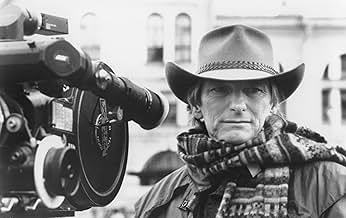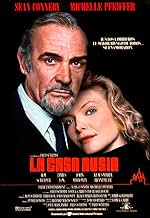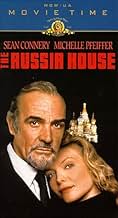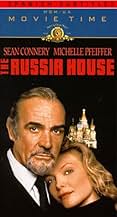A British publisher is sent a manuscript detailing Soviet Union nuclear missile capabilities. British Intelligence intercept it and recruit him to investigate the author's editor, a beautifu... Read allA British publisher is sent a manuscript detailing Soviet Union nuclear missile capabilities. British Intelligence intercept it and recruit him to investigate the author's editor, a beautiful Russian woman he claims never to have met.A British publisher is sent a manuscript detailing Soviet Union nuclear missile capabilities. British Intelligence intercept it and recruit him to investigate the author's editor, a beautiful Russian woman he claims never to have met.
- Awards
- 5 nominations total
Ian McNeice
- Merrydew
- (as Ian McNiece)
Peter Marinker
- U.S. Scientist
- (as Peter Mariner)
- Director
- Writers
- All cast & crew
- Production, box office & more at IMDbPro
Storyline
Did you know
- TriviaThe meaning and relevance of the title "The Russia House" is that it refers to the nickname given to the section of the British Secret Service that was assigned to investigating the Soviet Union.
- GoofsDuring Blair's "start the avalanche" speech, Dante is seen at the end of the table. As the camera pans around the table during the speech, Dante disappears from the end of the table, and then reappears.
- Crazy creditsThe credits appear over a series of clips showing location shots from the film, concluding with a repeat of the final scene.
- ConnectionsFeatured in Sean Connery: A BAFTA Tribute (1990)
Featured review
My first comment for this site....exciting stuff.
Prompted to write this by seeing this again on video - the third time for me, and it's rare that I want to see anything three times. And I realized that it's fascination still holds....this is one of my top 10, definitely.
The reasons I would rate this a "9", while somebody else would give it a "5.9" are largely personal....i think it always comes down to the personal. Talk all we want, when we watch a movie - as when we eat a meal, or kiss someone - the pleasure center in the brain either lights up or doesn't. For me it's all about the love of a place...for Scott Barley Blair it's early Glastnost Russia, for me it's 90's Germany - Hamburg, Berlin...the strangeness, the trueness of people who surround you in such a place and your love for them because of this. The fact that a film can light up specific sense memories like these means that it is true - at least in that respect. This is a remarkably honest film - terrifically unsensational for a spy film and one of the rare "love stories" that delivers the satisfactions expected of a "love story" without getting mawkish. Everything rings true here except for the ending (a fabricated "happy ending" which is the only thing that kept me from rating this a 10).
To ask for Manchurian Candidate type excitement from this low key film is wrong. The suspense, which is remarkably sustained (those rich long tracking shots of people walking through public places to uncertain destinations to meet with, or maybe not meet with shadow characters who may be allies or enemies) is the truer suspense of the uncertainty of living in a gray, gray world...where nothing much happens, but peril is part of the fabric of mundane life.
(Those sequences are gorgeous....the colors of autumn in a Leningrad park, the closeups of the stone gargoyles....the moody circular stepping pace of the soundtrack....Branford Marsalis' saxophone.) Someone has said here that it is talky. Yes, it is talky...but the talk is brilliant...it is the perfect reflection of a world where everyone - book publishers and bureaucrats and spies alike speaks in mannered, ritualized streams of code. This is not disinformation - it is perfectly understood by all, a language that has supplanted the language of an earlier age in which sincerity was an option.
Besides that ending, the piece is perfectly faithful to LeCarre's novel. LeCarre's books have had good luck when being translated into movies. Of the eight or so that have been adapted, four have made great films: The Spy Who Came into the Cold, The Russia House, and the two George Smiley BBC miniseries. LeCarre is a great writer and more specifically great at plotting and dialogue, and these films all succeed pretty much by filming what is written unadorned and pouring on the atmosphere. And they are blessed with lead performances by three great actors at the top of the form - Richard Burton, Sean Connery and Alec Guiness (Guiness especially...to watch him for six hours in Smiley's People is one of the great pleasures).
A beautifully efficient and elegant translation by Tom Stoppard of a great novel, wonderfully dignified and touching performances by Connery and Michelle Pfeiffer (never seen her better), a beautiful soundtrack by a second tier composer graced by the presence of a real jazz master, a terrific evocation of a place and time....a very moving film.
Prompted to write this by seeing this again on video - the third time for me, and it's rare that I want to see anything three times. And I realized that it's fascination still holds....this is one of my top 10, definitely.
The reasons I would rate this a "9", while somebody else would give it a "5.9" are largely personal....i think it always comes down to the personal. Talk all we want, when we watch a movie - as when we eat a meal, or kiss someone - the pleasure center in the brain either lights up or doesn't. For me it's all about the love of a place...for Scott Barley Blair it's early Glastnost Russia, for me it's 90's Germany - Hamburg, Berlin...the strangeness, the trueness of people who surround you in such a place and your love for them because of this. The fact that a film can light up specific sense memories like these means that it is true - at least in that respect. This is a remarkably honest film - terrifically unsensational for a spy film and one of the rare "love stories" that delivers the satisfactions expected of a "love story" without getting mawkish. Everything rings true here except for the ending (a fabricated "happy ending" which is the only thing that kept me from rating this a 10).
To ask for Manchurian Candidate type excitement from this low key film is wrong. The suspense, which is remarkably sustained (those rich long tracking shots of people walking through public places to uncertain destinations to meet with, or maybe not meet with shadow characters who may be allies or enemies) is the truer suspense of the uncertainty of living in a gray, gray world...where nothing much happens, but peril is part of the fabric of mundane life.
(Those sequences are gorgeous....the colors of autumn in a Leningrad park, the closeups of the stone gargoyles....the moody circular stepping pace of the soundtrack....Branford Marsalis' saxophone.) Someone has said here that it is talky. Yes, it is talky...but the talk is brilliant...it is the perfect reflection of a world where everyone - book publishers and bureaucrats and spies alike speaks in mannered, ritualized streams of code. This is not disinformation - it is perfectly understood by all, a language that has supplanted the language of an earlier age in which sincerity was an option.
Besides that ending, the piece is perfectly faithful to LeCarre's novel. LeCarre's books have had good luck when being translated into movies. Of the eight or so that have been adapted, four have made great films: The Spy Who Came into the Cold, The Russia House, and the two George Smiley BBC miniseries. LeCarre is a great writer and more specifically great at plotting and dialogue, and these films all succeed pretty much by filming what is written unadorned and pouring on the atmosphere. And they are blessed with lead performances by three great actors at the top of the form - Richard Burton, Sean Connery and Alec Guiness (Guiness especially...to watch him for six hours in Smiley's People is one of the great pleasures).
A beautifully efficient and elegant translation by Tom Stoppard of a great novel, wonderfully dignified and touching performances by Connery and Michelle Pfeiffer (never seen her better), a beautiful soundtrack by a second tier composer graced by the presence of a real jazz master, a terrific evocation of a place and time....a very moving film.
- steviekeys
- Jan 23, 2005
- Permalink
Details
- Release date
- Country of origin
- Official site
- Languages
- Also known as
- John le Carré's The Russia House
- Filming locations
- Lisbon, Portugal(on location)
- Production companies
- See more company credits at IMDbPro
Box office
- Budget
- $21,800,000 (estimated)
- Gross US & Canada
- $22,997,992
- Opening weekend US & Canada
- $4,435,650
- Dec 25, 1990
- Gross worldwide
- $22,997,992
Contribute to this page
Suggest an edit or add missing content







































